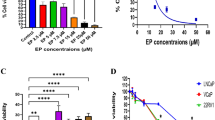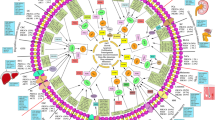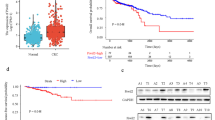Abstract
Prostate cancer (PC) is one of the most common types of cancers among men, referring to the uncontrolled growth of the prostate gland. It is increasingly recognized that the interaction of the glioma-associated oncogene (GLI) pathway and androgen receptor affects PC progression. Nevertheless, the effects of resveratrol on PC progression via Hedgehog (HH) signaling remain unexplored. In this study, the castration-sensitive and castration-resistant xenograft models in mice are systematically established using two different PC cell lines (LNCaP and PC-3). Further, the Western blotting, immunohistochemistry, MTT, Transwell, and RT-qPCR analyses are performed to verify the mechanistic views of resveratrol on PC and HH signals in vitro and in vivo. Resveratrol showed epithelial–mesenchymal transition (EMT) progression, inhibiting the tumor size and expression levels of vimentin, vascular endothelial growth factor (VEGF), and matrix metalloproteinases (MMP) 7, as well as upregulating the expression profiles the E-cadherin and Annexin 2. Moreover, resveratrol inhibited the hedgehog (HH) signals and tumor necrosis factor receptor (TNFR)-associated factor 6 (TRAF6) levels exhibiting the therapeutic action on castration-sensitive and castration-resistant PC cell lines. In summary, the overexpression of TRAF6 enhanced the viability and EMT progression of cancer cells. The resveratrol could alleviate the TRAF6 effect and regulate the HH signal to affect PC progression.



Similar content being viewed by others
References
Aripaka K et al (2019) TRAF6 function as a novel co-regulator of Wnt3a target genes in prostate cancer. EBioMedicine 45:192–207
Ashrafizadeh M et al (2021) Antitumor activity of resveratrol against gastric cancer: a review of recent advances with an emphasis on molecular pathways. Cancer Cell Int 21:66
Cai K et al (2019) Targeting the crosstalk between the hedgehog and NF-κB signaling pathways in multiple myeloma. Leuk Lymphoma 60(3):772–781
Chen Q et al (2020) Resveratrol attenuates neuroinflammation after deep hypothermia with circulatory arrest in rats. Brain Res Bull 155:145–154
Cortes JE et al (2019) Hedgehog signaling inhibitors in solid and hematological cancers. Cancer Treat Rev 76:41–50
Dias S et al (2013) Trimethoxy-resveratrol and piceatannol administered orally suppress and inhibit tumor formation and growth in prostate cancer xenografts. Prostate 73:1135–1146
Ge Y et al (2019) Resveratrol protects BV2 mouse microglial cells against LPS-induced inflammatory injury by altering the miR-146a-5p/TRAF6/NF-κB axis. Immunopharmacol Immunotoxicol 41:549–557
Gonnissen A et al (2017) Tissue microarray analysis indicates hedgehog signaling as a potential prognostic factor in intermediate-risk prostate cancer. BMC Cancer 17:634
Guo Q et al (2020) By targeting TRAF6, miR-140-3p inhibits TGF-β1-induced human osteosarcoma epithelial-to-mesenchymal transition, migration, and invasion. Biotechnol Lett 42:2123–2133
Hyuga T et al (2019) Hedgehog signaling for urogenital organogenesis and prostate cancer: an implication for the epithelial–mesenchyme interaction (EMI). Int J Mol Sci 21:58
Kar S et al (2017) SOX2 function and Hedgehog signaling pathway are co-conspirators in promoting androgen independent prostate cancer. Biochim Biophys Acta 1863:253–265
Khusbu F et al (2020) Resveratrol induces depletion of TRAF6 and suppresses prostate cancer cell proliferation and migration. Int J Biochem Cell Biol 118:105644
Krishna Moorthy H, Laxman Prabhu GG, Venugopal P (2019) The resurgence of estrogens in the treatment of castration-resistant prostate cancer. Indian J Urol 35:189–196
Li G et al (2013) Dietary resveratrol prevents development of high-grade prostatic intraepithelial neoplastic lesions: involvement of SIRT1/S6K axis. Cancer Prev Res (Phila) 6:27–39
Li J et al (2014) A novel anticancer effect of resveratrol: reversal of epithelial–mesenchymal transition in prostate cancer cells. Mol Med Rep 10:1717–1724
Li J et al (2014) A novel anti-cancer effect of resveratrol: reversal of epithelial–mesenchymal transition in prostate cancer cells. Mol Med Rep 10:1717–1724
Massah S et al (2021) GLI activation by the estrogen receptor in breast cancer cells: regulation of cancer cell growth by Gli3. Mol Cell Endocrinol 522:111136
Montano M et al (2018) Dual regulation of decorin by androgen and Hedgehog signaling during prostate morphogenesis. Dev Dyn 247:679–685
Pak S et al (2019) The small molecule WNT/β-catenin inhibitor CWP232291 blocks the growth of castration-resistant prostate cancer by activating the endoplasmic reticulum stress pathway. J Exp Clin Cancer Res 38:342
Pietrobono S, Gagliardi S, Stecca B (2019) Non-canonical Hedgehog signaling pathway in cancer: activation of GLI transcription factors beyond smoothened. Front Genet 10:556
Qu C et al (2018) Smoothened stabilizes and protects TRAF6 from degradation: a novel non-canonical role of smoothened with implications in lymphoma biology. Cancer Lett 436:149–158
Sun W et al (2019) Combination of phospholipase Cε knockdown with GANT61 sensitizes castration-resistant prostate cancer cells to enzalutamide by suppressing the androgen receptor signaling pathway. Oncol Rep 41:2689–2702
Tovar C et al (2011) MDM2 antagonists boost antitumor effect of androgen withdrawal: implications for therapy of prostate cancer. Mol Cancer 10:49
Uvez A et al (2020) Synergistic interactions between resveratrol and doxorubicin inhibit angiogenesis both in vitro and in vivo. Pol J Vet Sci 23:571–580
Yang R et al (2019) Polymeric micellar delivery of novel microtubule destabilizer and Hedgehog signaling inhibitor for treating chemoresistant prostate cancer. J Pharmacol Exp Ther 370:864–875
Yang M et al (2020) TRAF6 promotes gastric cancer cell self-renewal, proliferation, and migration. Stem Cells Int 2020:3296192
Acknowledgements
We sincerely acknowledge the support of the Second Affiliated Hospital of Xi’an Jiaotong University.
Author information
Authors and Affiliations
Contributions
Conceptualization and original draft preparation: JL; data curation: ZW; formal analysis: HL; investigation: JC; methodology: NN and YL; software: XZ and TC; Review and editing: JL.
Corresponding author
Ethics declarations
Conflict of interest
The authors declare that they have no conflicts of competing interests.
Consent to participate
Not applicable.
Additional information
Publisher's Note
Springer Nature remains neutral with regard to jurisdictional claims in published maps and institutional affiliations.
Supplementary Information
Below is the link to the electronic supplementary material.

10616_2022_544_MOESM1_ESM.jpg
Figure S1 Differences between PC-3-derived and LNCaP-derived tumors for 4 weeks. Graphical representations illustrate the tumor volume of PC-3 and LNCaP cells in vivo in the (A) the control group, (B) the LPS group, (C) the resveratrol group, (D) the LPS+resveratrol group. (*refers to PC-3 comparison with LNCaP group, * indicates P < 0.05; n.s. means no significant) (JPG 383 kb)
Rights and permissions
Springer Nature or its licensor holds exclusive rights to this article under a publishing agreement with the author(s) or other rightsholder(s); author self-archiving of the accepted manuscript version of this article is solely governed by the terms of such publishing agreement and applicable law.
About this article
Cite this article
Li, J., Wang, Z., Li, H. et al. Resveratrol inhibits TRAF6/PTCH/SMO signal and regulates prostate cancer progression. Cytotechnology 74, 549–558 (2022). https://doi.org/10.1007/s10616-022-00544-0
Received:
Accepted:
Published:
Issue Date:
DOI: https://doi.org/10.1007/s10616-022-00544-0




